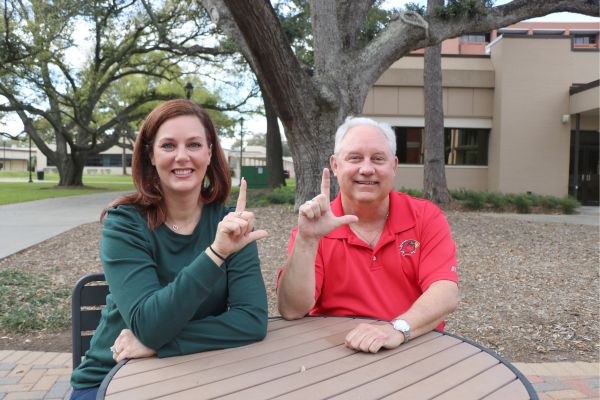LU Moment: Beyond the Podcast with the Center for Resiliency
On this week's episode of the LU Moment, we caught up with Assistant Director of Engagement for LU’s Center for Resiliency, Teressa Robertson, and Instructor for the Department of Communication and Media and University Press Faculty Adviser/Advertising Manager, Stephan Malick.
 In this Q&A session, we delve deeper into the programs and initiatives of the Center for Resiliency and how they impact LU and beyond.
In this Q&A session, we delve deeper into the programs and initiatives of the Center for Resiliency and how they impact LU and beyond.
Missed this week’s episode? You can listen to it at
What were some of the things about the Center for Resiliency that you didn’t have enough time to share about during the podcast interview?
Teressa: I would like to mention a few new initiatives sponsored by the Center for Resliency regularly.
The Brown Bag lecture series is a presentation series intended to highlight the current research of our facility and students. These lectures are hosted on the last Tuesday of each month from 12:40 p.m. – 2:00 p.m., in the new Signature Centers suite conference room located in the Cherry Engineering Building in room 105. There is also a Teams option for those who cannot attend in person. These lectures are open to all LU family, and we encourage student participation. This is a great opportunity to network with students and faculty who have similar interests and career paths, as well as present your own research and knowledge. We encourage all to grab a lunch and enjoy these short presentations with us.
We also have our SmartStorm disaster training modules, a disaster response community impact initiative produced in partnership with 四虎影视 Center for Resiliency and Voluntary Organizations Active in Disaster (VOAD). This is a learning portal, available via distance learning technology. It provides useful and critical information for preparing for and coping with the effects of Hhurricanes, floods, and damaging weather. This powerful tool can assist homeowners, VOAD, and interested persons in preparation, organization, response, recovery, assessment, and mitigation of the effect of disasters and storms. There are 3 three courses are currently available within the SmartStorm Learning portal, and participants receive a disaster backpack equipped with emergency disaster supplies upon verification of completion of any of the 3 three modules.
How does the Center for Resiliency differentiate from traditional university extension services, and what advantages does its model offer in terms of gathering, analyzing, and disseminating regional information.
Teressa: The Center presents a futuristic paradigm for higher education in Texas. Whereas university extension services disseminate centralized information regionally, the Center for Resiliency provides a model for completing the circle by gathering regional information from numerous stakeholders and then compiling, analyzing and funneling the knowledge locally, regionally, statewide, and beyond.
In what ways does the Center for Resiliency contribute to LU’s vision of leadership in quality educational opportunities, and how does it serve as a futuristic paradigm for higher education in Texas?
Teressa: It is a multi-directional hub for information, back-and-forth from communities to agencies to universities and a contributor to long-term collaborations. For instance, continuing education opportunities are offered through collaborations between the Center, multiple colleges of LU, and the community. For instance, Continuing Education Units are offered through partnership between the Center and the Department of Energy, LU’s Department of Social Work, the Master Naturalist Program, and the Flood Coordination Study Meetings.
Tell us about the MIND Project and its purpose?
Stephan: The Mental Health Intervention, Networking and Diversion (MIND) program came from and idea between colleagues — Ginger Gummelt, department chair of social work, Lori Wright, instructor of social work and field director, Mamta Singh, associate professor of teacher education, Karen Roebuck, instructor criminal justice department, and myself, to address locally a growing concern that our area jails and prisons have become the primary facilities for housing those experiencing mental health crises. We wanted to create a model that can be used by law enforcement, courts, counties, and facilities to improve outcomes for residents facing a post-disaster trauma and mental health crisis.
What is the impact to the local community and students?
Stephan: One goal is to work on educating law enforcement officers, attorneys, and judges about mental health as a crucial factor in decreasing the number of individuals with mental health issues being incarcerated. Additionally, the program creates internships for students to foster their professional development, identity, and institutional partnerships. For example, student interns will be shadowing professionals at the Spindletop Center and the Family Treatment Drug Courts — we've had a lot of positive collaboration with law enforcement, judges and courts and mental health professionals.
What is the importance of this kind of research for LU and the greater Southeast Texas region?
Stephan: Student participation in this project enhances student learning opportunities that develop practical knowledge and skills for career development. We are working to develop a model to bridge between theory and practice, where students apply professional practice in real-world scenarios outside of the classroom.
